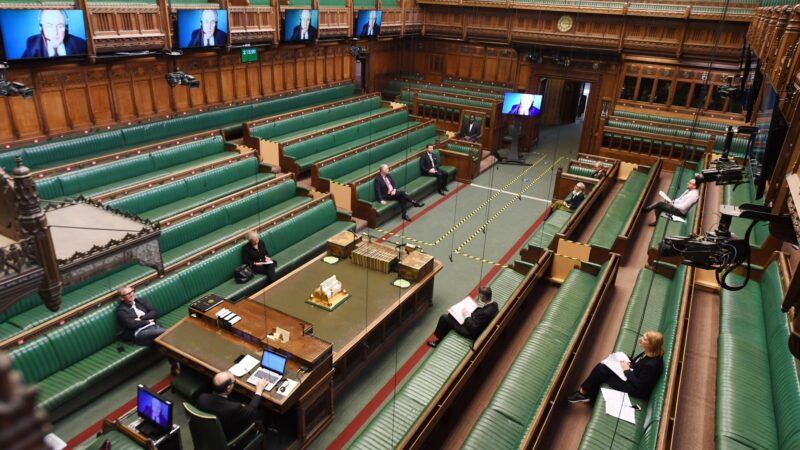
Labour frontbencher Luke Pollard has argued that it is “actions, not words, that we need” to combat the climate emergency as a government minister confirmed to MPs that the long-awaited environment bill would be delayed again.
Addressing parliament as the Commons considered amendments to the legislation this afternoon, the Shadow Environment, Food and Rural Affairs Secretary described the Conservative administration as a “go-slow” government on climate action.
The government tonight rejected Labour amendments maintaining the ban on bee-killing pesticides, ensuring the independence of the proposed environmental watchdog and enforcing stricter air quality targets by 2030.
“This legislation is not perfect by any means,” Pollard told MPs today. “But this bill should already be law. The deliberate pausing of report stage after today means this bill won’t see some amendments debated by MPs until May.
“It won’t be in the Lords until just before the summer and it risks not being on the statute book until the autumn. This means we could be waiting over six months more for an environmental watchdog, for powers to stop our children breathing unsafe air and to regulate ministers’ actions… This simply isn’t good enough.
“What a terrible message to send to the world in the year we’re hosting COP26. This was supposed to be in law before Britain left the Brexit transition period and it’s not. It was supposed to be bold and world leading because of the urgency of the climate crisis and it’s not.
“But this is a go-slow government when it comes to environmental action. If you could solve the climate crisis with press releases, then the planet would have nothing to worry about – but it is actions, not words, that we need.”
Ministers announced earlier today that the long-awaited piece of legislation would be delayed, ostensibly due to the pandemic response taking up too much time to allow for proper debate. It is now unlikely to pass late this year.
DEFRA minister Rebecca Pow said this morning that the government remains “fully committed to the environment bill” and argued that “carrying over the bill to the next session does not diminish our ambition for our environment in any way”.
This is the third time the bill has been delayed since work on it began in July 2018, and environmental campaign groups have warned that this could damage the credibility of the UK at key international environmental summits this year.
Pollard told parliament this afternoon: “Labour will not vote against this bill today. We will not do anything to frustrate our fight against the climate and nature emergency. Even go-slow action is better than no action at all.
“But we will push our amendments to the vote because this bill really should have been better and bolder it should be embedding an insatiable drive and a green passion at the very heart of this government, but it doesn’t…
“Instead of this bill being a deep green, it’s merely a bland beige – necessary and needed but pedestrian in its ambition. It needs more focus and priority than the government has offered to date…
“This bill does not do enough, nor is it fast enough. I genuinely want us to build back better, but if this bill was insufficient before the pandemic it is wholly inadequate now the pandemic’s horrors have been laid bare.”
Labour tabled several amendments to the bill, which were rejected by the government. Amendment 25, voted down by 354 to 227 votes, would have required the government to meet 2005 World Health Organisation targets on air quality by 2030.
Amendment 23 would have removed a clause allowing ministers to give guidance to the proposed Office for Environmental Protection (OEP), which Pollard explained would “effectively let the government mark their own homework”.
Ministers have described the OEP as a body to hold government and public authorities to account “without fear or favour” but campaigners have warned the watchdog will not be sufficiently independent or powerful under the current bill.
Amendment 39, rejected by 366 to 221 votes, would have required parliamentary scrutiny on exemptions for the use of plant protection products banned under retained EU law, including bee-killing neonicotinoid pesticides.
“Bees are essential to the future of our planet, to pollinating our crops, to our rich tapestry of biodiversity,” Pollard said this afternoon. “Bee health is non-negotiable. This is what MPs on all sides of the House say in good times.
“So, I expect them to say it now…. This ban must not be set aside just because it’s convenient to do so now. There’s no doubt that sugar beet farmers have been hit hard by crop blight, but lifting this ban is not the solution.”
Labour amendment 24 would have set a minimum standard of protection under the Registration, Evaluation, Authorisation and Restriction of Chemicals (REACH) EU regulation on the production and use of chemical substances.
The amendment from the opposition would have removed from the legislation the ability of the Secretary of State to be able to introduce lower standards than are in place currently. It failed as 227 MPs voted in favour but 357 voted against.
The environment bill sets out a framework by which ministers can impose new targets on vital issues such as air pollution and water quality, waste, resource use and biodiversity, which were previously regulated under EU directives.
Critics have pointed out that the targets defined are long term, removing any incentive for speedy attempts to reduce pollution, and campaigners have called on the government to introduce short-term, legally binding requirements.
While amendments to the legislation were considered and voted on by MPs in the Commons this evening, the bill will now return for consideration in the next parliamentary session in the spring for a second day of the report stage.




More from LabourList
‘As metro mayors gain power, Labour must tighten political accountability’
Letters to the Editor – week ending 22 February 2026
‘The coastal towns where young people have been left behind by Whitehall’